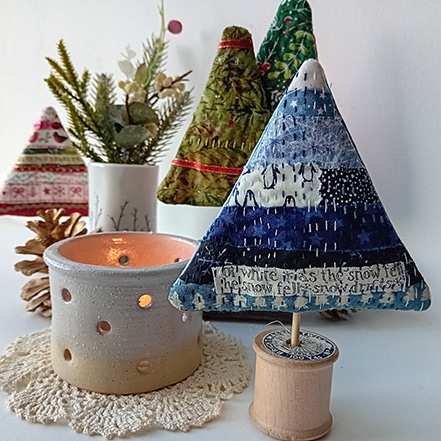
A Christmas Forest – Slow Stitched Christmas Trees
Workshop Information
Using your favourite Christmas themed fabrics, sparkly threads, sequins, beads, buttons and ribbons make a forest of beautiful slow stitched trees.
Slow Stitching embraces environmental and sustainable method of using what you already have rather than buying more. We will, where possible, recycle and reuse what we have to hand in our homes and our stashes. We usually find we have so much more than we realise. It’s an ideal project for using up those tiny fabric scraps and off cuts from previous projects.
We will begin with a patchwork or fabric collage base for our trees. I’ll demonstrate my use of the invisible baste stitch to secure our foundation fabrics. You can always use little dabs of glue such as Pritt stick if you wish.
We will use only the most festive of embroidery stitches and colour palettes. Use hero fabrics as the focus of your tree’s theme and highlight a motif or pattern. Work with embroidery stitches to suggest structure and movement. I will introduce adding yet more texture to our trees, learning to work with trickier metallic yarns/threads and add Shisha mirrors or sequins for a touch of glitter and Christmas sparkle.
All levels and experience are welcome.
Materials
These are the materials and equipment I like to use when I’m making the slow stitched trees, but please use what you have to hand. There are so many wonderful materials to play with and variations to make.
A piece of base fabric, Cat will provide this.
Fabric scraps, any Christmas themed fabrics you might have are useful but not essential; you can make beautiful themed trees by simply working within a colour palette. For example, if I picked the colour red to work with I might choose some striped red and white scraps, a selection of different plain reds, a small floral pattern, something with small spots in white or gold or even something with little stars on. None of those patterns are overtly Christmas themed but with the appropriate use of threads and stitches we can bring out that idea.
Threads, anything you have in your sewing box from stranded cotton like DMC or Anchor to sewing machine threads and thicker threads like cotton perlé size 8 is great as these give a thicker more textured line. Monofilament threads like silks are great too. I love a good variegated thread for colour and texture. We can also use any metallic threads you might have too. I again select colours that go with the fabrics I’ve chosen.
Metallic threads: I use a Madeira machine thread (gold no. 3 & 6) and hand embroidery stranded threads, DMC gold 5282.
Needles, the most important thing to consider is can you thread your needle with the thread you’ve chosen? Can you see the eye of the needle and is the point nice and sharp?!
Embellishments, any sequins, glittery ribbons, beads, buttons or stars in your chosen theme.
Pins will hold our fabric to our bases before we start stitching, safety pins will also work.
Fabric Glue Pen, students on previous classes have found the use of a Sewline glue pen to be handy or even a cheeky dab of a Pritt stitck to hold pieces in place. It’s not an essential.
Tree Trunks, I’ve used food bamboo skewers from a supermarket, Cat will have a stash to get us going.
Tree Bases, for my samples I’ve used old wooden cotton reels, sawn sections of tee branches and pieces of driftwood. You need something with a little weight to be able to support the tree. It is not essential to have your bases ready for the workshop. You have plenty of time to make your trees whilst keeping your eyes peeled for a suitable option.
You’ll also need a pair of scissors, small embroidery and slightly large pair for cutting fabric. Please bring a thimble or needle puller if you like to use these tools.
What I love most about this form of sewing is the tools are simple and straight forward and the materials are what we have to hand, using recycled or repurposed items. So please don’t worry if you haven’t got anything exactly as it appears on the list above.
Finally….
Stitch Dictionary You may wish to have a book of stitches to refer to for inspiration, but this is not essential as I will provide a simple stitch guide in class.
